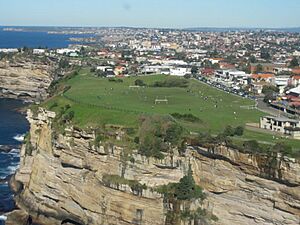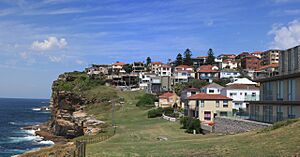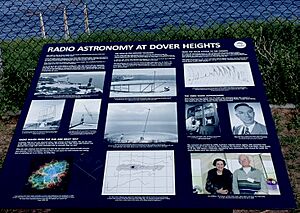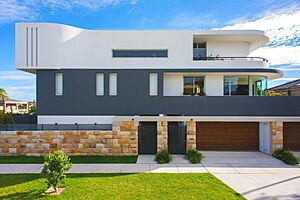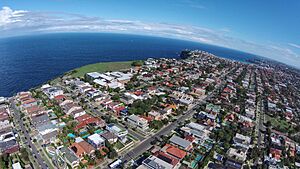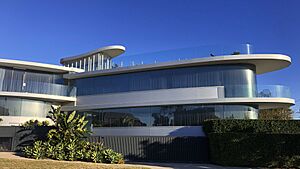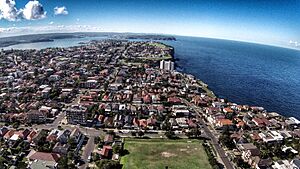Dover Heights facts for kids
Quick facts for kids Dover HeightsSydney, New South Wales |
|||||||||||||||
|---|---|---|---|---|---|---|---|---|---|---|---|---|---|---|---|
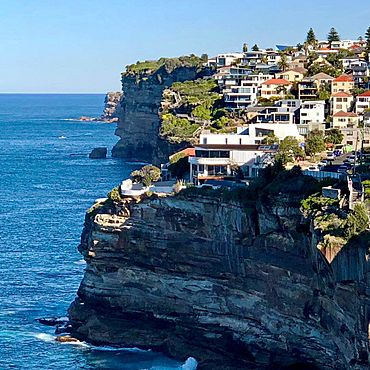
Dover Heights with the Tasman Sea on the left
|
|||||||||||||||
| Population | 3,802 (2016 census) | ||||||||||||||
| Postcode(s) | 2030 | ||||||||||||||
| Elevation | 85 m (279 ft) | ||||||||||||||
| Location | 9 km (6 mi) from Sydney CBD | ||||||||||||||
| LGA(s) | Waverley Council | ||||||||||||||
| State electorate(s) | Vaucluse | ||||||||||||||
| Federal Division(s) | Wentworth | ||||||||||||||
|
|||||||||||||||
Dover Heights is a beautiful coastal suburb located in the eastern part of Sydney, New South Wales, Australia. It's about 9 kilometres east of the main city area, known as the Sydney CBD. This suburb is part of the Waverley Council area, and its postcode is 2030.
Contents
Where is Dover Heights Located?
Dover Heights is surrounded by other suburbs. To the north, you'll find Vaucluse. To the south is North Bondi. On its western side is Rose Bay. And to the east, it faces the vast Pacific Ocean.
This suburb is mostly made up of homes. Many houses in Dover Heights have amazing views of Sydney Harbour and the famous Sydney Harbour Bridge. Some lucky homes even have views of both the harbour and the ocean!
Dudley Page Reserve is a popular spot. It offers fantastic panoramic views over Sydney Harbour. It's a great place to watch the sunset or enjoy a picnic. The Dover Heights Coastal Reserves are also stunning. They are part of the Bondi to Watsons Bay Cliff Walk. These reserves include Weonga Reserve, Rodney Reserve, and Raleigh Reserve.
Dover Heights is known for being a very wealthy area. It's considered one of the most affluent suburbs in Australia. This means that property prices here are quite high.
A Look Back: History of Dover Heights
Dover Heights likely got its name from the cliffs along the Pacific Ocean. These cliffs reminded people of the famous white cliffs in Dover, Kent, England. The name "Dover Heights" first appeared in official records in 1886. In the early days, the land was used for market gardens.
Around 1830, a man named Daniel Cooper owned land in this area. He was a partner in a company called Cooper and Levey. This company owned a large store in Sydney. The Dover Heights area was later divided into smaller plots for building homes in 1913.
Who Lives in Dover Heights?
According to the 2016 census, there were 3,802 people living in Dover Heights. Most residents, about 53.7%, were born in Australia. Other common birthplaces included South Africa (14.8%) and England (3.6%).
English is the main language spoken at home by 75.0% of people. Other languages include Russian (3.1%) and Hebrew (2.7%). When it comes to religion, Judaism is the most common, followed by those with no religion and Catholics. Dover Heights has one of the highest percentages of Jewish residents in Australia.
Amazing Architecture
Dover Heights is home to many interesting and award-winning houses. These homes often take advantage of the stunning cliff top and city views.
Some famous houses include:
- The Butterfly House – This home on Military Road was designed by architect Ed Lippmann.
- Moebius House – Located on Military Road, this house was designed by architect Tony Owen.
- Light House – Found on Wentworth Street, this house was designed by Peter Stutchbury. It won the Wilkinson Award in 2015.
- The Cliff House – Another impressive home on Wentworth Street.
- The Wave Dover Heights – This building on Military Road was designed by Paul Brough and Andre Baroukh. It won several awards in 2015 for its design.
- The Holman House – On Hunter Street, this house also won the Wilkinson Award in 2005.
Other notable homes can be found at 1 George Street, 21 Hunter Street, 57 Eastern Ave, and 12 Douglas Parade.
Dover Heights and Radio Astronomy
During the Second World War, Rodney Reserve in Dover Heights was important. The Royal Australian Air Force used it for coastal defence radar. After the war, the CSIRO (Australia's science agency) used the site for exciting experiments in radio astronomy.
A team of scientists, including John Gatenby Bolton, made history here. In 1945, they were the first to observe radio waves coming from the sun. They used special antennas called Yagi antennas. They also identified the first radio source that could be seen in the sky. This source was in the constellation Taurus and was named Taurus A. We now know this is the Crab Nebula, which is what's left of an exploding star. Chinese astronomers first reported this exploding star in the year 1054.



